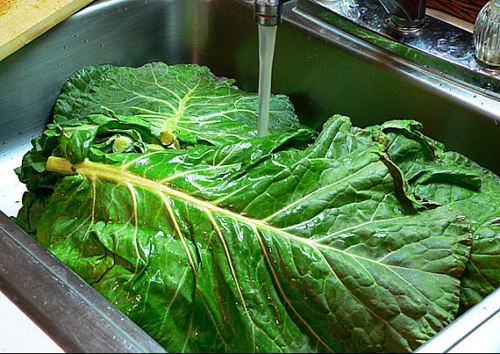According to the Food and Drug Administration (FDA) an estimated 48 million people, every year get sick from eating contaminated food. Over the last few years, there have been outbreaks of foodborne illnesses due to bacteria on fruits and veggies like cantaloupe, lettuce, tomatoes, and spinach. Consuming foods that are contaminated can result in a trip to the hospital for especially seasoned folks.
Is unwashed produce safe?
There are folks who don’t think twice about biting into an unwashed fruit or munching on lettuce that hasn’t been rinsed off. According to the Environmental Working Group, a nonprofit organization, almost 70% of fruits and vegetables in the United States have pesticide residue.
Sometimes, fresh produce contains harmful bacteria such as Salmonella, E. coli, or Listeria. These types of germs can make folks very sick and can especially be dangerous for those with weakened immune systems and for adults over age 65.
BEFORE you put a piece of fruit or fresh veggies in your mouth, make sure you take the necessary steps to ensure their safety.
Wash your produce
Here are some recommendations from the FDA regarding the proper washing of fruits and veggies:
- wash hands both before and after food preparation
- cut away any damaged areas before preparing or eating
- fruits with firmer skins like apples, melons, lemons, and pears, as well as root vegetables like potatoes, carrots, and turnips, can benefit from being brushed with a clean, soft bristle to better remove residues from their pores.
- rub produce under running water
- remove the outermost leaves of lettuce, Brussels sprouts, spinach, and cabbage then submerge in a bowl of cool water, swish, drain, and rinse with fresh water
- berries, mushrooms, and other types of produce that are more likely to fall apart can be cleaned with a steady stream of water and gentle friction using your fingers to remove grit.
- dry fruits and vegetables with a clean cloth or paper towel
It is not necessary to wash produce labeled as prewashed. It is also unnecessary to wash produce with soap or other cleaning products.
Since the COVID-19 pandemic, folks have been wondering if they should use more aggressive washing methods like using soap, bleach, baking soda, vinegar, lemon juice, or a commercial cleaner to wash their fruits and veggies. Well, health experts and agencies like the FDA and Centers for Disease Control and Prevention (CDC) strongly advise against doing so and recommend using cool water and light scrubbing methods with a brush to properly and safely clean produce.
Bleach can be lethal if ingested and should never be used to clean foods. Furthermore, other “cleaners” have not been shown to be any more effective at cleaning produce than just plain water.











